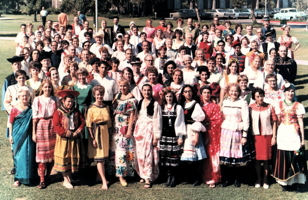
|
The Society of Folk Dance Historians (SFDH)
Attending Folk Dance Camps
[
Home |
About |
Encyclopedia | CLICK AN IMAGE TO ENLARGE |

|
QUESTION
"Would like to know about the dance camps. Never been to one and want to. I am not [of the nationality of the camp] . . . don't know if that's a problem. Which do you consider is best."
ANSWER
I know some people who have been dancing for years who won't consider going to a camp, and others who go to every camp that they can.
Some issues (and this is NOT a complete list):
- It's probably a good idea to attend only if you've been dancing at least semi-regularly for at least three years. The most common reason given to me for not enjoying camps overall (rather than a specific camp) is not knowing enough of the dances done during "open dancing" in the evening programs and between teaching sessions. (The program typically includes a larger variety of dances than is played in most weekly groups.) Another common complaint given is that the dances taught are too difficult, which is more likely to be related to being a relative newcomer.
- Do you think that you would enjoy spending a minimum of six hours, and possibly up to about ten, per day learning dances at a camp? I personally enjoy it; some don't. A related question is whether you would enjoy dancing day after day, with no long breaks. Again, I like it; some don't.
- Dance sessions at a camp are usually very large and crowded. If you normally dance in a large group, you won't notice the difference, and may enjoy the greater level of excitement. If you dance in a small group, you may be overwhelmed.
- How important is the quality and style of teaching to you? Many of the teachers at camps are primarily choreographers, and their teaching ability and styles vary greatly. It can be quite exciting to learn directly from the choreographers, and you can be sure that you're learning each dance exactly as choreographed, but it can also be frustrating.
- Are couple dances done in the groups in which you regularly dance? The percentage of couple dances at camps seems to range from around 20% to around 40%. It's easier to find partners at camps than in many regular groups, but that doesn't help if your local group doesn't do any (or more than a handful of) couple dances, and so you don't know them.
- Do you like dancing amongst many people whom you've never seen before? I know some dancers who like seeing exactly the same people week after week, and who don't enjoy any other environment. Others like the opportunity to meet new, interesting people.
- Regarding not being of the nationality of the type of camp (for example, not being Jewish but attending an Israeli dance camp): I don't think that most people care about a dancer's ethnic or religious background.
- As to which camps are best: There's no good answer, as it is very dependent on individual preferences. My advice is to talk to the directors of each camp that you're considering, and ask some very specific questions about issues that are important to you.
Used with permission of the author.
From "Answers" by Jim Rothman
from an August 19, 2002, post on the Rikud discussion list.
This page © 2018 by Ron Houston.
Please do not copy any part of this page without including this copyright notice.
Please do not copy small portions out of context.
Please do not copy large portions without permission from Ron Houston.